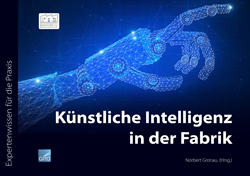The increasing complexity of industrial manufacturing processes and the associated challenges in terms of planning and control require new approaches to optimization. The user conference „Artificial Intelligence in the Factory“ in 2019 provided specific assistance for questions relating to the applicability of AI mechanisms for the industrial manufacturing context. As part of the user conference, the visitor were presented with specialists lectures selected experts, reports from users and special application scenarios around the factory. Furthermore, visitors were given the opportunity to experience AI application fields in practice as part of a virtual tour of the Potsdam Research and Application Center Industry 4.0. This enabled users to get an impression of the potential for their individual processes. During the conference, small and medium-sized companies in particular received ideas and suggestions for the implementation of their AI project in the manufacturing context.
Benefits:
- Exclusive first-hand expert knowledge
- Exchange of experiences with experts and targeted participants
- Artificial Intelligence & Industry 4.0 live
Topics & Focuses
- Potential and challenges of artificial intelligence for manufacturing
- Solving complex planning problems using AI mechanisms
- Cooperation between humans and artificial intelligence
- Effects of AI on the world of work
- Acceptance of AI solutions
- AI solutions for small and medium-sized businesses
- AI solutions for logistics and quality assurance
Location
Sheraton Frankfurt Airport, Frankfurt/Main
Programm
Arten und Einsatzgebiete für Künstliche Intelligenz
Die Bedeutung von Lernen und Domänenwissen für KI-Anwendungen
Akzeptanzfaktoren für KI-Lösungen
Voraussetzungen für Einsatz von Machine-Learning Technologien in der Industrie
Verfügbarkeit von Daten als wesentliche Herausforderung bei der Projektumsetzung
Nutzung von „augmented data“ als Grundlage für Einsatz von ML und KI im Speziellen
Chancen von Künstlicher Intelligenz – intelligente Assistenz
Kollaboration von Mensch und Künstlicher Intelligenz im betrieblichen Alltag
Grenzen von Künstlicher Intelligenz
Anwendungen von KI in der Reihenfolgeplanung für die Fertigung
Methoden zur systematischen Reduktion des Lösungsraums für Planungsprobleme
Vergleich unterschiedlicher Ansätze zur Beherrschung komplexer Probleme
Herausforderungen für Automatisierung im Kontext der auftragsbezogenen Fertigung
Einsatz von KI-Mechanismen zur Optimierung der Produktionssteuerung
Cloudbasierte Produktionsplanung und -steuerung
Lessons Learned
Exemplarische KI-Use Cases für KMU im Fertigungsumfeld
Umsetzung von Industrie 4.0 als Grundlage für erfolgreiche KI-Lösungen
Validierung von Standardisierungsprojekten mittels Testbeds
Qualität prognostizieren
Stör- und Einflussfaktoren auf Qualität identifizieren
Empfehlungen für Maschinensteuerung zur Vermeidung von Minderqualität
Mehrwert von KI-Anwendungen für den Anwendungsbereich Logistik
Anwendungsfall: Tracking und Steuerung von Warenbewegungen mittels Kamera-Infrastruktur und Deep Learning
Hinweise und Besonderheiten zur Gestaltung und Umsetzung von KI-Projekten
Evaluation von KI-Algorithmen für die Fertigungssteuerung
Einsatzmöglichkeiten von KI zur Realisierung innovativer Schutzkonzepte
Adaptive Mensch-Technik-Interaktion mittels KI
Ansprechpartner
Kontakt für inhaltliche Fragen

Benedict Bender
Eventorganisation & Marketing

Giulia Copat
- Keine Kategorien
Recent Posts
Recent Comments
Archives
Categories
- Keine Kategorien
- Keine Kategorien
Join us on 4th of April while we open new prospects of trending designs and client requirements.
500 Terry Francois Street San Francisco, CA 94158
This site uses cookies. Find out more about cookies and how you can refuse them.


